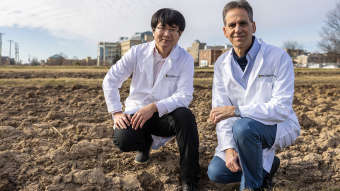
July 18, 2023
Contact: Brian Consiglio, 573-882-9144, consigliob@missouri.edu
Patients who are discharged after vascular surgeries to treat a wide range of ailments involving heart and blood flow issues are far more likely to be readmitted to the hospital for a preventable matter than patients who return home after other types of surgeries. Many vascular surgery patients have coexisting medical conditions, such as diabetes or high blood pressure, that can negatively impact surgical site infections, blood circulation and wound healing, increasing their risk of complications and unplanned hospital readmissions.
To better understand the challenges related to the hospital discharge process that may influence unplanned readmissions, Elizabeth Doss, a doctoral student at the University of Missouri’s Sinclair School of Nursing, worked with a team led by Todd Vogel, an associate professor in the MU School of Medicine and chief of vascular surgery at MU Health Care, to conduct a study in which nurses, physicians, patients and health care staff were interviewed about the obstacles they faced during the discharge process.
The study’s goal was to examine factors in the discharge process that can be improved to reduce preventable hospital readmissions which negatively impact the health outcomes of patients and can lead to additional stress on family members and the already overburdened American health care system.
“Once we better understand the day-to-day challenges faced by the different stakeholders involved in the discharge process, we can work to improve it by identifying targeted interventions,” Doss said. “As a nurse practitioner, I personally have felt the pressure to work quickly to discharge patients, but after listening to people’s experiences, it reminded me that we need to slow this part of the hospital process down to ensure families and patients have the information they need and that is makes sense to them.”
In the study, the team conducted focus group interviews with nurses, physicians, patients and other health care staff involved in vascular surgeries at an acute care hospital in Missouri during the height of the COVID-19 pandemic. They identified obstacles related to sending prescriptions; making follow up appointments; obtaining medications and wound care equipment; patient education regarding their diagnosis; and confusion regarding who to contact with follow-up questions or troubleshooting issues that arise at home.
Another common issue for nurses and hospital staff was a constant feeling of being rushed given the fast-paced work environment. This prevented nurses and staff from having enough time to communicate with their patients regarding appropriate discharge plans and protocols to ensure a safe and effective discharge process. Also, visitor restrictions for family caregivers compounded these issues during the COVID-19 pandemic, given the critical role family caregivers often play in supporting patients during their recovery.
“Patients may struggle with contacting health care providers or not knowing who to call to ask for help,” Doss said. “After vascular surgeries, patients often go home with specialty wound care devices that can be tricky to set up, use and troubleshoot when issues or questions arise. Patients may not always remember what they were told immediately after the surgery when the discharge plans were being discussed. So, the challenge becomes how do we streamline these communication processes to ensure health care providers, patients and their families are all on the same page.”
As a registered nurse for the past 20 years, Doss knows firsthand the challenges associated with taking care of acutely ill patients, especially after vascular surgeries. She hopes her research can inform potential interventions to reduce hospital readmissions not just for Missourians, but patients nationwide.
“Going forward, discharge coordinators and family caregivers can play a key role in supporting patients on their road to recovery,” Doss said. “Other options could include something such as a mobile phone application to help patients better communicate with their health care providers about questions or issues that might arise.”
“Discharge process challenges of an academic vascular surgery service: A qualitative study” was published in Research in Nursing & Health. Coauthors include Todd Vogel, Robin Kruse, Maraya Camazine, Chase Schlesselman and Lori Popejoy. Funding was provided by the University of Missouri School of Medicine Translational Research Informing Useful and Meaningful Precision Health grant awarded to Todd Vogel.



